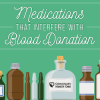Donors want to provide blood to people who need it the most. It’s an admirable thing to do, and only 38 percent of the U.S. population is eligible to donate, according to the American Red Cross. If you are considering donating, it’s important to know what conditions may make you ineligible. Here is some insight into medications that would remove you from the potential donor list.
You are ineligible if you have ever taken these medications:
According to the Food and Drug Administration, taking the following medications make a person unable to donate blood:
- Proscar (finasteride), which is prescribed to men with enlarged prostate glands
- Avodart (dutasteride) is another drug that helps individuals with prostate enlargement
- Propecia (finasteride) is a medicine for individuals who are fighting baldness
- Individuals with severe acne may turn to Accutane (also known as Amnesteem, Claravis, Sotret or isotretonoin) Those who have severe psoriasis and take Soriatane (acitretin) or Tegison (eretinate)
Any form of insulin from cows, growth hormone from human pituitary glands or experimental medications can also interfere with blood donation. People who have taken Hepatitis B immune globulin, Feldene (for arthritis), Plavic and Ticlid at any point in their lives are also not able to donate. These rules are for the safety of both the donor and the blood recipient.
The Mayo Clinic has a more extensive list that adds the following:
- Coumadin (Jantoven, warfarin)
- Heparin
- Framin (dalteparin)
- Pletal (cilostazol)
- Xarelto (rivaroxaban)
- Eliquis (apixaban)
- Aggrenox (dipyridamole)
- Orencia (abatacept)
- Effient (prasugrel)
- Remicade (infliximab)
- Enbrel (etanercept)
- Humira (adelimumab)
- Cimzia (certolizumab pegol)
- Actemra (tocilizumab)
Blood thinners that are used to prevent blood clots, greatly alter the blood and cannot be used by donors. Lovenox (enoxaparin), which can prevent deep vein thrombosis, and Pradaxa (dabigatran etexilate), which prevents clots in people with atrial fibrillation, are also problematic. Make sure to share information about any prescription or over-the-counter drugs and medications that you are taking when you do a pre-donation mini-physical before donating blood. If you are unsure about your medication and want to check beforehand, call your doctor to verify that you are able to donate. This may save you a trip to a donation center or mobile blood bank. If you are unable to donate but still want to be involved, you can volunteer to help run a blood donation drive. This way you’re providing assistance even though you can’t give blood yourself.
If you found an error, highlight it and press Shift + Enter or click here to inform us.



